When we returned to Mytilene in October 2016, during the same week the citizens of Lesvos finally did not receive the Nobel Peace Prize for their courageous support of refugees both at sea and after arriving on their island. Everywhere in the media still reviews of the last year – and not much about the changes and the current situation.
We returned to the place that we had visited only a year earlier, in October 2015, and our memories of that time are still fresh. We want to reflect on the transformations that we witnessed and share some of our impressions.
At the shores, October 2015
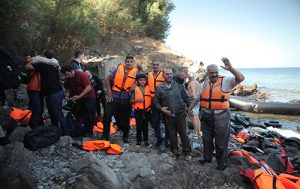
What happened in 2015 along the shores of Lesvos was extraordinary. Many of the boats that landed on the beaches in the north and the south-east of the island had to be assisted. They were welcomed not only by the local residents of Lesvos, whose laudable efforts gained attention worldwide, but, latest from August 2015 onwards, also by people from all over the world, who came to Lesvos to help. In summer 2015, more and more initiatives became involved also in rescue operations, including anarchist groups from Athens, life-guards from Spain, Médecins Sans Frontières (Doctors Without Borders) who cooperated with Greenpeace, a German boat from Sea-Watch, and many others. Activists from Denmark and Spain were later criminalised for their courageous effort to save lives at sea. At that time, push-backs and violence at sea seemed to have disappeared in this part of the Mediterranean. Through the WatchTheMed Alarm Phone we were in contact with more than 1000 boats in the Aegean Sea. In the majority of the cases, we worked in close cooperation with networks composed of Syrian and Iraqi activists, who accompanied thousands of boats via WhatsApp and other digital technologies. At the same time, many people drowned in the waters before the northern coast of Lesvos in October 2015. Without all of these solidarity networks, many more would have lost their lives. While the crossing was still risky, and many suffered severely on the boats, it was clear that once they had overcome the sea, their journeys ahead would be less dangerous. Their movements opened the Balkan route and most of the people we had met last autumn arrived already weeks later in Germany and Sweden. October 2015 was the peak of the ‘long summer of migration’.
At the shores, October 2016
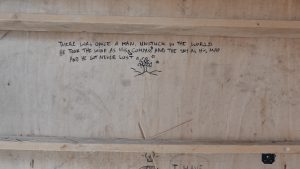
We can still see and feel the remnants of last year. When we went to Korakas in the north of Lesvos, to visit the place of the memorial-plaque which we had erected there in 2010, there still is a watch-post run by Médecins Sans Frontières (MSF) in cooperation with volunteers from Lighthouse relief. Inside the lighthouse, there are still remains, left behind during the time of so many arrivals.
In the beginning of 2016, authorities began to pressurise activists and volunteers working at the beaches to get registered with them. Since then, only NGOs who cooperate closely with the coastguards and Frontex are allowed to be present there. Nonetheless, some others remain present, such as the Greek NGO ERCI in the south, and Proactiva Open Arms, the Spanish life-guards, in the north. Boat-arrivals have significantly decreased since the borders to Macedonia were closed and since the EU-Turkey deal forced those arriving on the island to remain there, in unbearable conditions and continuously threatened by deportations back to Turkey. NATO warships patrol the entire coast. While they hardly ever intervene directly, their radars will detect a lot of the movements at sea, and once detected, they alert the Turkish authorities to intercept the boats. Interceptions and transfers back to Turkey occur daily. Those who finally make it across report that they had to attempt to cross the sea several times until they made it. Some of our friends from Izmir, who join us on Lesvos, give us impressions from Basmane/Turkey, where up until the beginning of this year, thousands passed through hotels while waiting to go to Cesme or other places, to then get onto the boats from there. Basmane now is a quiet place. No life jackets are sold in the shops. Today’s crossings are prepared in a completely clandestine fashion. Nothing is visible anymore, which means also that sea crossing are becoming increasingly dangerous.
Moria, October 2015
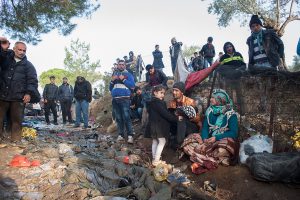
Exactly one year ago, in October 2015, it was the time of the highest number of arrivals that Lesvos had ever seen. At its peak, 10,000 people reached the island in one day. In October 2015 we spent days mainly near Moria, mainly at night. Back then, the so-called “hot spot” was officially opened, during a time of heavy rainfalls. We were there while the UNHCR and all official NGOs had declared the area too dangerous for their staff. During these nights, only activists and volunteers, mainly women, tried to carry unconscious people out of the mud, covering at least the smallest babies with blankets. The situation last October was described as a humanitarian catastrophe. At the same time, we witnessed then already how EU border regime was trying to re-establish its control. In a common statement between Welcome to Europe and WatchTheMed Alarm Phone, we analysed and described the situation.
Moria, October 2016
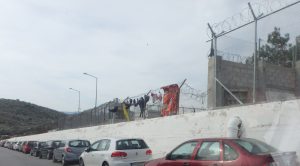
100 cars wait in a line, and all sorts of international NGOs work inside the overcrowded “hot-spot”. They keep it running, in close cooperation with EASO, Frontex and the Greek Police.
The prison became its own world, with its own rules, a machinery of separation. In the ‘inside’ of the inside, all those are detained in this closed part of the camp who newly arrived and wait for registration. Latest after 25 days, they will leave to the ‘outside’ of the inside, to the open part of the camp. The unaccompanied minors are detained in an own section of the prison and longer, for their own ‘protection’, until a place in a youth accommodation is found for them, sometimes months later. Detained are also all those who are “ready to be deported”, and, in another closed section, those who have in desperation signed the agreement to be “voluntarily returned” to Turkey. In every corner of the camp you feel how the management of this self-created crisis has turned into a huge business. While volunteers are still present, everyone who enters, even the open part of the camp, is registered properly with one of the NGOs. It is forbidden to take pictures. It is forbidden to distribute information. Three of us got controlled by the police when distributing the Welcome to Greece guide. The refugees stuck in Moria keep asking desperately about their future – and there are few answers to all their questions. Apart from those who have families in other EU member states, there is no legal way to leave the island. They are fed up with so many NGOs passing by while nothing changes afterwards. Nearly every day there are outbursts of violence – among different ethnic groups, often related to the use of the limited space in the overcrowded camp. Regularly there are also riots. Twice, Moria was burning already – but there seems to be no response, hardly any signs of solidarity, and so these upheavals end with several arrests. What we found particularly depressing this year was witnessing how the suffering of refugees seemed to be produced in such an “ordered” fashion. This technocratic system of dispersed violence becomes ever-more difficult to contest. There still is violence, but it seems more invisible now. NGOs present there create the illusion of assistance and support, but they have become part of a system that covers up the ways in which it administers and reinforces the misery of all those who are denied the possibility to find the protection they so urgently need.
The harbour of Mytilene, October 2015
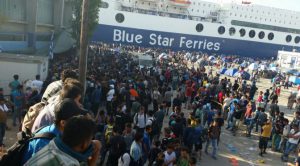
Over the last years, we took uncountable pictures at the harbour of Mytilene! Farewell pictures of those who left, who were excited to take the next step toward their desired final destination. Welcoming those who are in transit means wishing farewell to them, and hoping to meet soon again, hopefully in a safer place somewhere in Europe. For us, the harbour of Mytilene was a symbol, one crucial leg in the journeys of thousands.
The harbour of Mytilene, October 2016
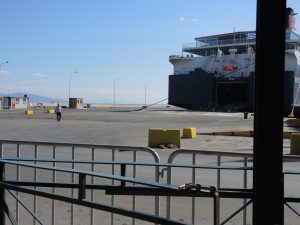
Fences surrounding the harbour have destroyed this Aegean point of arrival and farewell. It is not a lively space anymore. Police and Frontex are everywhere. There now are strict controls at the entrance leading to the ferries leaving for mainland Greece. Police vans carry prisoners from the mainland to be deported back to Turkey from here. At the end of our journey back to the border, the friends who joined our travelling group from Athens could not board the ferry to return on Saturday morning. Just as all those who have official registration papers which allow them to travel inside of Greece, they were denied the right to board the ferry, simply because the checking of their papers had to wait until Monday – and then again to Tuesday.
Ferries not Frontex acquires another meaning when ferries are used by Frontex to deport.
This was the island of welcome – will it now transform into the island of deportations?
This question concerns to all of us who have been part of welcoming networks.
We wish the residents of Mytilene the strength to resist being eaten out and spat out by the EU’s politics of closure and of denial of protection. The wars in Syria, Iraq and Afghanistan have not ended, they keep on raging. Pakistan and Iran are not safe. People from Eritrea and Ethiopia continue to flee from the oppressive regimes. Somalians run from recruitment by Al Shabab. And so many people have to leave their countries of origin because they cannot survive without the ability to find an income.
As long as this suffering continues to exist all over the world, and is created and reinforced by EU policies of exploitation, we cannot be silent when Europe closes its gates.
For the Freedom of Movement for All!
